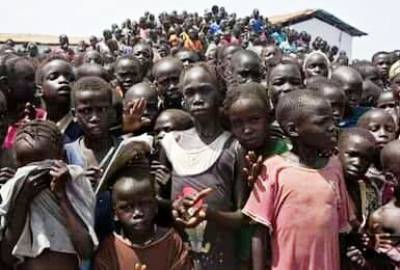Ethiopia begins civil registration for refugees
By Tesfa-Alem Tekle
October 27 2017 (ADDIS ABABA) – The Government of the Federal Democratic Republic of Ethiopia on Sunday began accepting applications from refugees for civil registration, in a new programme launched and is expected to be held country-wide.

They will also receive a certificate to document the event, identical to those issued to nationals.
“Allow me to congratulate all refugees for being guaranteed equal access to register their vital life events regardless of their nationality or status.” said Ato Zeynu Jamal, the Deputy Director of the Administration for Refugee and Returnee Affairs (ARRA).
“Refugees will now be able to officially record their births, marriages, divorces and deaths free of charge and receive certificates to document the event, which is among the fundamental protection tools.”
In further remarks made, the Deputy Director reconfirmed the continuing commitment of the Government to refugee protection, but also reminded the international community of their shared responsibility to support.
“On the basis of the principles of burden and responsibility sharing I urge all stakeholders to continue supporting the government of Ethiopia in its endeavours to comprehensively respond to the multi-faceted development needs of the refugees”.
Certificates were immediately issued on site to 11 of the refugees whose birth and marriage details were registered at the offices of ARRA in Addis Ababa. A similar launch was held in each of the 26 refugee camps and seven zonal offices in Ethiopia.
The Representative of the United Nations High Commissioner for Refugees in Ethiopia, Clementine Nkweta-Salami, applauded the Government of Ethiopia for its commitment to make civil registration accessible to refugees and thanked all those who contributed to the successful launch of the registration.
“The achievement we are celebrating today is intrinsically linked to the implementation of the Comprehensive Refugee Response Framework (CRRF) in Ethiopia, which represents a unique opportunity to change the way humanitarian and development actors work for the benefit of refugees and host communities”, said Nkweta-Salami.
“With the New York Declaration we have a renewed possibility to pursue this vision that promises to significantly strengthen the international response to large movements of refugees. The launch of the registration of refugees’ vital events is the first step in this direction”, she added.
More than 70,000 refugee children born in Ethiopia over the last decade have not had their births registered and have the option to receive birth certificates. Children born before the new law came into force can apply for retroactive issuance.
Speaking on behalf of the Dutch government which supported the roll-out of the new registration system, Bengt van Loosdrecht, its envoy to Ethiopia said: “There are still millions of refugee children around the world without birth certificates, without proof of existence. We need to give them a tangible proof that they count, because every refugee counts.”
Reminding the audience that it is a universal right and extremely important for every single child to have a birth certificate, Ambassador Loosdrecht said, “That is why we are proud to celebrate this big event not only in Addis, but in all major regional cities.”
Representing the refugee community, John Youhanes Magok, extended gratitude to the Ethiopian government and all those who supported the roll-out of the new civil registration programme.
“This will also help access to education”, said Magok, adding “but more needs to be done to help refugees in Ethiopia” and called up on those present to support refugees to be able to support themselves. Ethiopia, which currently hosts more than 883,000 refugees, is a pilot country for the Comprehensive Refugee Response Framework (CRRF) and works closely with the government and partners to help not refugees but also the communities hosting them.
(ST)
